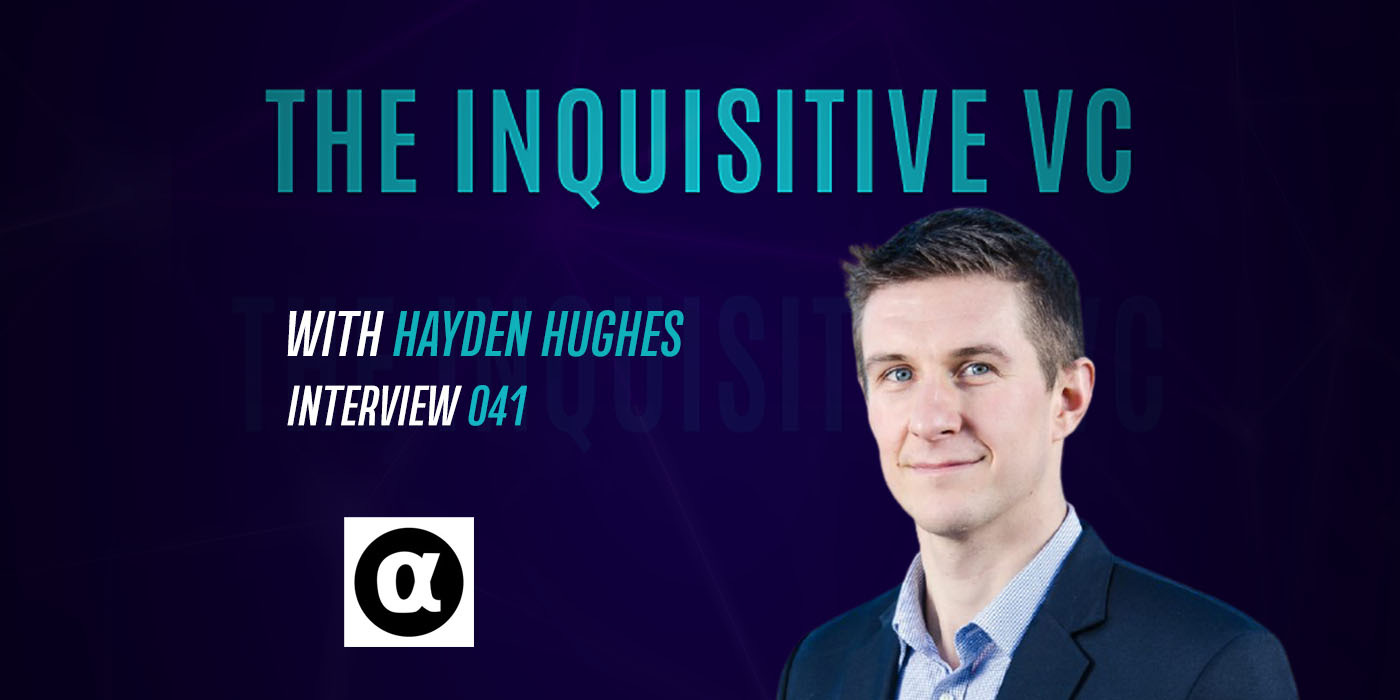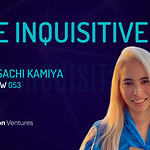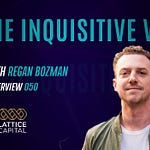Hayden Hughes is the co-founder and CEO of Alpha Impact, a crypto copy-trading platform. Previous to this he worked at Crypto.com and Techemy and is an experienced founder.
We talk about how he got into crypto, starting Alpha Impact, how to balance token and equity investors, DeFi and more!
The podcast is also available on your favourite podcast sources like Spotify, Apple and Youtube!
NA: First of all, thanks for jumping on. Appreciate your time. I want to get started with talking about how, and when you got into crypto and the story behind that.
HH: Sure. Boy, it was a long time ago; it feels like several lifetimes! So I'm a lawyer by training and finished law school and didn't really want to actually practice law. It didn't seem that appealing to me. I started working in Venture Capital, and I remember working on a small transaction and I came across some entrepreneurs who had done an ICO and raised $15M in minutes, in mid-2017.
They later did a public sale for $80M and it occurred to me that given the scale of funds being raised, crypto was here to stay. So I started going to events in New Zealand, where the landscape is dominated by just a few companies. I ran into some execs from one of the large companies including my former employer, Techemy. Techemy is a regulated investment bank that raised $500M USD in 2017/2018. I had the chance to join the business and I was tasked with building a due diligence framework for the many token transactions we were investing in and syndicating. I knew nothing about crypto and had impostor syndrome… but given the number of deals that were coming through I had to learn very, very quickly. Before long I was running deals and they moved me across to Asia in 2018. So that's the abridged version of how I got into crypto.
NA: Nice. How did you move to the other side from being on the side where you're helping companies raise money and investing to going towards and starting your own crypto company?
HH: I mean, I've never really left crypto, right? I moved on to start my own advisory business and later joined a large crypto exchange.
I always knew I’d start my own crypto company, and I just didn’t feel like I had a use case or a strong idea. In 2020 I was actually making more money trading than I was at my day job. I had a vague ambition to start a company and joined the Antler accelerator. Antler is a really great place to go in that situation because you don’t need an idea. My Co-Founder is an engineer and evidence driven, and had done thousands of hours of research on 20 tokens including DeFi and NFT coins like SNX and DeFi. He had a thesis that seemed too good to be true. I asked if I could send some money and have him invest for me, and the idea was born to build Alpha Impact. We sent a survey to 100 people asking if they could generate a 2000-3000% annualized return, would they want to copy a top trader. More than 80 of the respondents asked us then and there if they could send us money so we knew there was demand.
NA: Got it. Yeah. That's a great story. What would you say would be the biggest challenge that you faced setting up this type of business compared to your previous experiences?
HH: Well, one of the challenges has really been people. We've made a conscious decision not to go remote with our development work. What that has meant for us is that we have local developers here in Singapore and it's been extremely difficult to find.
It's easy to find offshore devs, but we've decided that we don't want to deal with different iterations of codes, backdoor codes, and a lack of bonding.
I think the most difficult part has been scaling the tech capacity. We have seven local developers in Singapore. It has been hard bringing foreign talents to Singapore. Getting a work visa approved for a foreigner is tough on new businesses.
It gets easier over time, but COVID hasn't made that scenario easier. The real big challenge has been scaling the tech team.
Surprisingly, one thing that has not been challenging for Alpha Impact has been funding. We're solving a really important problem in crypto, and we're really grateful to have had investors who share that vision, solve this problem with us.
NA: That plays really well into my next question, which is how was the journey fundraising for your token round?
HH: The idea of raising capital for any business is really centred around, “Can you find investors who share your vision? Can you find investors who understand you as a founder?” When we had our first capital raise, it was an equity round. We did it with Antler and raised $100K.
We had nothing. We had zero lines of code built. As you move forward, you have more of something, but you're still not there yet. Investors want to see some form of traction, users and growth and revenue, stickiness and customer acquisition costs, and channels and unit economics. It's very difficult for investors to evaluate a very early-stage opportunity.
Imagine, if you're copy trading me, you're some university student, you have a hundred dollars. The fee might be less than a dollar, right? We're not going to charge your credit card 82 cents and split the fee to traders, insurance, and company treasury. The transaction costs would be very high.
I think the interesting thing about doing this in a bull market meant that we were able to create IMPACT token, which would accelerate payments within our ecosystem.
We had the opportunity early in the market cycle because we saw what was happening obviously. Having worked in this space for many years, I had some existing relationships and it really started with a conversation with our lead investor.
I can't say the name of that lead investor because of confidentiality, but it's an international high-frequency trading firm that has an interest in crypto. We had the chance to chat with those guys and we shared what we're doing, and they really believed in us.
They have a big-name brand, and after that conversation, we had done due diligence and they said, “If you do decide to go ahead with this token, we'd like to be your first investor and we'd like to give you some cash.”
After we had them on board, it was easy. Before that, we were having conversations with a few people. There was some hesitation but as soon as we had that big name brand on board, everyone fell in line quickly. We were actually in a position where we could, and I know it sounds crazy, but we could choose who we wanted.
You know, you have only so much allocation left and you're saying, okay, well, what could you do relative to what that investor can do, which is perhaps a sign of the interest in crypto.
NA: Yeah, that's always a great position to be in. And you mentioned you did an earlier equity round. So how do you think between the two, having token investors and equity investors? How does the alignment between those two different investors work?
HH: It's a great question and we're kicking off another equity capital raise. We just had the Antler demo day and dozens and dozens of VCs reached out to us. So, we're just kind of going through that process and answering this question almost on a day-to-day basis.
One of the things that we said early on with Antler, who is our founding investor, they didn't give us a ton of cash, but they believed in us and they gave us something when we had nothing, we had a pitch deck and no lines of code yet. We wanted to make it fair for them and we actually didn't think clearly at the time of equity investment what the crossover would be.
We decided that we would include them in the tokens that we have.
Now, we're raising a seed round, kind of a pre-series A. Those investors will have some exposure to the token.
There are different ways to do that, whether it's some kind of a conversion. So, if you buy X dollars’ worth of equity, we'd give you Y dollars’ worth of tokens or you just hold a lot of tokens in your balance sheet and then you’re on the company's balance sheet which gives investors who are uncomfortable setting up wallets and undergoing compliance because it is a complicated process to hold crypto.
It still gives them economic exposure without the risks of doing all those things or at least risks that they see. So that's the token to equity value accrual.
In the other direction, we're using the token in our ecosystem too.
For every dollar of sales or fees that we generate, there's one to two thirds that gets given to the trader, 5% goes into an insurance pool and 5% into a long-term liquidity lockup. Then the rest goes to us. If you think about it mathematically, the long-term liquidity lockup and the insurance pool creates a framework where every dollar of transactions is having a net deflationary effect on the supply of the tokens.
We're engineering the token to increase in value. The theoretical approach that we've taken is that more transactions, more customers equals more scarcity of the token. A way that the token will do well is if we succeed in solving our mission: we’re making crypto trading accessible for everyone, whether you've got $25 million or $25 dollars. That's something that's not possible today.
It's very hard to find a trading strategy if you're someone who's new, or if you're someone who doesn't have a lot of money.
We really saw an opportunity to build this as a social media play, which I'll get into maybe a bit later, but I guess the value upside for the token investors is that they have the ability to hold those tokens until such a point that they mature. They could sell them if they wanted.
The equity investors have some exposure to the token plus the equity itself.
NA: Yeah, that's an interesting model. I'm interested to hear what piece of advice you would give someone who's looking to start a crypto company now?
HH: Have a solution to an important problem.
In 2017, it was easy to raise funding and that created an environment where we have people who are raising for the wrong reasons. I have people messaging me saying, “Hey, you guys did a token, teach me how to do a token.” The difference that I would observe between the 2017 market and this market, anything could get funded in 2017. Not anymore.
You could be doing a weather prediction algorithm. You could be doing bibles on the blockchain. The raise sizes were much bigger. It was like 50 million, 30 million, 20 million, 10 million.
In the 2021 market, raises have been much smaller and they've been really focused on three use cases. If you’re not in one of these spaces, you can't really get funding.
Number one has been crypto trading. Is there a more efficient way to trade? Can you improve the crypto trading landscape? Number two has been DeFi, DeFi refers to decentralized finance where smart contracts can execute autonomously. So, you can design a contract, for example, Nawaz, if you deposit Bitcoin in my smart contract, I will allow you to borrow another currency. If the value of your Bitcoin decreases, I will ask you to pay back the other currency that I've loaned you, or I will start selling your Bitcoin at cost.
The interesting thing is that this and it's never in terms of, what we call the loan to value ratio, it's always very conservative. If you're giving me a million dollars of Bitcoin, I'm only giving you 200K or 400K worth of whatever it is.
So what we saw with Bill Hwang and Archagos Capital is that the banking system actually does this very inefficiently. They say, “Okay, Nawaz, you seem like a good guy. We know you well, we've known you for a long time, here's some money you don't have to give us any collateral but please pay us back.”
And it turned out that Mr. Hwang was borrowing from all these different lenders to essentially go long on a very small basket of stocks and the concentration risk was very high. This would never happen with a smart contract. A) It must be collateralized B) The collateral always covers the outstanding loan.
And for B), if the collateral starts decreasing value, that collateral gets sold. That is a margin call. Something Bill Hwang failed to make and caused Goldman, and a few other banks to famously pull the rug on all the other banks.
The lenders got together, and they said, how are we going to fix this situation? Goldman sold everything left of Bill’s holdings and covered their own base, but smaller banks were left holding nothing. This scenario would never happen in DeFi.
Sorry, long tangent, but just coming back to the question, I think the three use cases are: Crypto trading, DeFi and NFTs. Those have been the only three that we've seen getting funded. You have to solve business problems in those 3 categories. Also, I think it's very important to have the credibility to solve one of those problems if you're wanting to raise in crypto today.
NA: Yeah, great point. Would you be able to talk a little bit about Alpha Impact and what is your vision there?
HH: Sure, great question. Austin and I started the business to solve a problem most people face when they start investing in crypto.
Austin and I started this business and we started with a very simple problem most people have when they get into crypto: it's very hard to find a trustworthy source of information. When we're learning about crypto, we talk to our friends, we go online, we look on Reddit, we look on YouTube, we look on Tradingview and there are all these sources of information, but no transparency. No transparency.
There are crypto influencers on YouTube that don't hold any crypto. You would assume that, if they're talking about Ethereum, they hold it. But, they could have sold all their Ethereum last night and you'd have no way to know if they're credible as a source of information. We thought about this from the perspective of transparency.
The information that we do find is often conflicted and everyone has a conflict of interest. The model we settled on is a social media network. Our platform feels like a less noisy, educational Twitter.
It's a place where people who are new to crypto or want to better learn crypto, or even people who are in crypto can come and find a good trader to follow. There are two things they can do: 1) They can get information from that person and see what they're thinking. 2) They can copy that person's portfolio.
The way that it works, we assume that another issue on top of this knowledge barrier is trust.
We've built this as a plugin to an individual’s exchange account. If you are our customer, you would be prompted to join the platform and share what's called an API key, which would give us the ability to execute trades from your account in your exchange.
That way, you always keep the funds in your account. The other part is you will never have to send money to us.
We're trying to solve a trust problem. We're trying to solve the information problem. We're trying to solve the access problem. We have the ability because the trader shares their account activity with us in real-time via this connection.
We can make a leaderboard that updates in real-time. There is a leaderboard of top traders based not only on the traditional metric, like the top returning trader but also based on the interests of individual people. For example, you could find the top trader who's trading Bitcoin, you can find the top Proof of Stake trader.
Another area that we thought about innovating was around how we can cater for people who don't want to take so much risk?
Austin and I have 2000% to 3000% higher returns, but that return is generated by taking an incredible amount of risk and in the worst months of an 18-month run, my portfolio value has gone down 50%.
A lot of people aren't comfortable taking that risk and want something that's safe, not volatile. We've built in some financial metrics for risk. There's a leaderboard that people can find. Maybe you want a very low-risk consistent trader who's maybe only returning 1%, but they're returning 1% every month.
There's a newsfeed where you can see all these traders, what they're doing. The leaderboard is a way to actually find traders and get access to all kinds of different people who maybe are different to you know the traders I would want to follow, but maybe they’re what other people would want to follow.
That's kind of the principle we started with and we're just finishing our beta now and gearing up for launch. It's very exciting.
NA: Yeah, it does sound exciting. I like the fact that you're playing, taking like the social media play. Thanks so much for joining me, Hayden. I had a great time talking about your journey building Alpha Impact and the fundraising.
HH: Thanks so much, Nawaz. Feel free to join us at alphaimpact.fi - we’d love to welcome you to our trading platform.
Disclaimer: The Inquisitive VC is provided for informational purposes only and is not intended to provide commercial, financial or legal advice. Nothing in this article constitutes an offer of securities or regulated financial products or financial services to any person.















Share this post